Conflict Zones
Israel pushes on with strategy to keep neighbours weak in Lebanon and Syria | Syria’s War News

Beirut, Lebanon – Israel’s continuing attacks intend to keep its neighbours unstable, weak and fragmented, analysts say, and are contributing to the derailing of governing projects in Lebanon and Syria.
Conversations with experts, analysts, and diplomats reveal a belief that Israel wants to keep the two states weak and fractured, maintaining Israel as the strongest regional power.
“The Israelis believe that having weaker neighbors, as in states that aren’t really able to function, is beneficial for them because, in that context, they’re the strongest actor,” Elia Ayoub, writer, researcher, and founder of The Fire These Times podcast, told Al Jazeera.
Lebanon and Syria, the targets of Israel’s forays, have largely not retaliated against the Israelis, who outpower them militarily, financially and technologically.
‘Israel has no limits’
Lebanon and Syria are both in a fragile condition.
Lebanon has been in dire economic straits for at least six years, with bouts of political paralysis, and has just emerged from a prolonged Israeli assault that killed more than 4,000 people and destroyed swaths of the country.
That war, which also badly damaged the armed movemen tHezbollah, a major domestic actor in Lebanon since the 1980s, ostensibly ended with the November 27 ceasefire.
Syria, meanwhile, recently emerged from a nearly 14-year-long war that displaced millions and killed hundreds of thousands.
The transitional government is working to unify armed factions, stabilise the economy and gain international recognition.

Along with Lebanon, which is led by its first functioning cabinet in years, Syria has new leadership that wants to turn a page on recent history but, analysts told Al Jazeera, Israel seems intent on preventing that.
Israel has been violating the ceasefire with Lebanon since it was signed, justifying each breach by claiming it had hit “Hezbollah targets”.
The situation is particularly gruesome along Lebanon’s southern border, where some villages were obliterated during the war and others were completely razed since the ceasefire was agreed on.
“There are a lot of violations,” a member of Lebanon’s civil defense force, who asked to not be named, told Al Jazeera from the battered southern town of Meiss el-Jabal, adding, “There’s nothing we can do about it.”
Israel has also refused to fully withdraw from Lebanon, as the ceasefire stipulates, instead, leaving its forces in five points that experts say are likely being held for future negotiations over delineating the Lebanon-Israel border.
“The very clear path ahead is that Israel has no limits in its operations within Lebanon,” Mohanad Hage Ali, a senior fellow at the Carnegie Middle East Center in Beirut, told Al Jazeera.
“The only distinction made is in firepower and destruction, which is reserved for disproportionate responses to attacks on northern towns in Israel.”
Israel betting on Syria’s failure
In Syria’s chaos following the Assad regime’s overthrow on December 8, Israel launched attacks on military infrastructure around the country, focusing on the south and creeping its forces further into Syrian territory.
Syria’s transitional government has said it has no interest in regional war. Instead it has said that it has no intention to attack Israel and would respect the 1974 Agreement on Disengagement between the two countries.
But the Syrian government’s overtures fell on deaf ears, and the attacks have continued.
The Israeli government immediately revealed its position towards the new Syrian government following President Bashar al-Assad’s overthrow, calling it “a terror group from Idlib that took Damascus by force”. Israel has since repeatedly bombed Syria, and seized territory along the frontier between the occupied Golan Heights and the rest of Syria.

“Israel has made a bet that Syria will fail and will be fragmented,” Aron Lund, a fellow at Century International, told Al Jazeera.
“What they’re doing is trying to position themselves in that scenario, as a push to have sway over the south and keep it unthreatening to them and protect their now almost unlimited freedom of manoeuvre in their airspace.”
In March, Israeli air strikes on Syria increased and expanded to new areas, with ground incursions increasing by 30 percent, including into the southern areas of Deraa and al-Quneitra.
“The impact on civilians has been increasingly deadly,” Muaz al-Abdullah, ACLED’s Middle East Research manager, said in a statement.

“To defend themselves, residents in the village of Kuya, in Deraa, fired warning shots to deter Israeli forces from advancing into the village on March 25. The response by Israeli forces was an air strike and shelling of the village, and at least six civilians were killed.”
Imad al-Baysiri, from Deraa, told Al Jazeera about a similar incident in Nawa, 34km (21 miles) north of Deraa city.
The Israeli army “tried to advance to all the large squares in Nawa so some young men started running and the Israeli army started shooting at them”, he said, adding that locals confronted the army and forced them to retreat.
“They brought in helicopters and drones and for around four hours bombed the area,” he said. “Warplanes and helicopters also bombarded the city of Nawa with missiles from helicopters and drones.”

‘They know war, but not peace’
Analysts can see little that would stop Israel’s near-daily attacks on Lebanon and Syria.
“They listen to Americans, but only to a certain extent,” a Western diplomatic source, speaking on condition of anonymity, told Al Jazeera.
Hezbollah’s arsenal may once have acted as a deterrent, but the latest war has changed that calculus.
“All deterrence has been lost,” Hage Ali said.
Without any diplomatic or military pressure in its way, Israel seems set on disrupting any progress in Lebanon and Syria and keeping them mired in chaos.
“That’s how Israel views its best-case scenarios in the region,” Ayoub said. “It speaks to a deep cynicism at the heart of Israeli politics, and one that comes from decades-long militarism that has become a normalised part of day-to-day Israeli political culture.”
Many analysts have spoken of Israel needing a “forever war” in the region, something that it would be “quite comfortable” in, according to Natasha Hall, senior fellow at the Middle East Program at the Center for Strategic and International Studies, speaking at the American University of Beirut on April 8.
Or, as the diplomatic source told Al Jazeera: “This [Israeli] government has shown that it knows how to make war. But it has yet to show that it knows how to make peace.”
Conflict Zones
Trump says US may ‘pass’ on helping end war if Russia, Ukraine resist deal | Russia-Ukraine war News
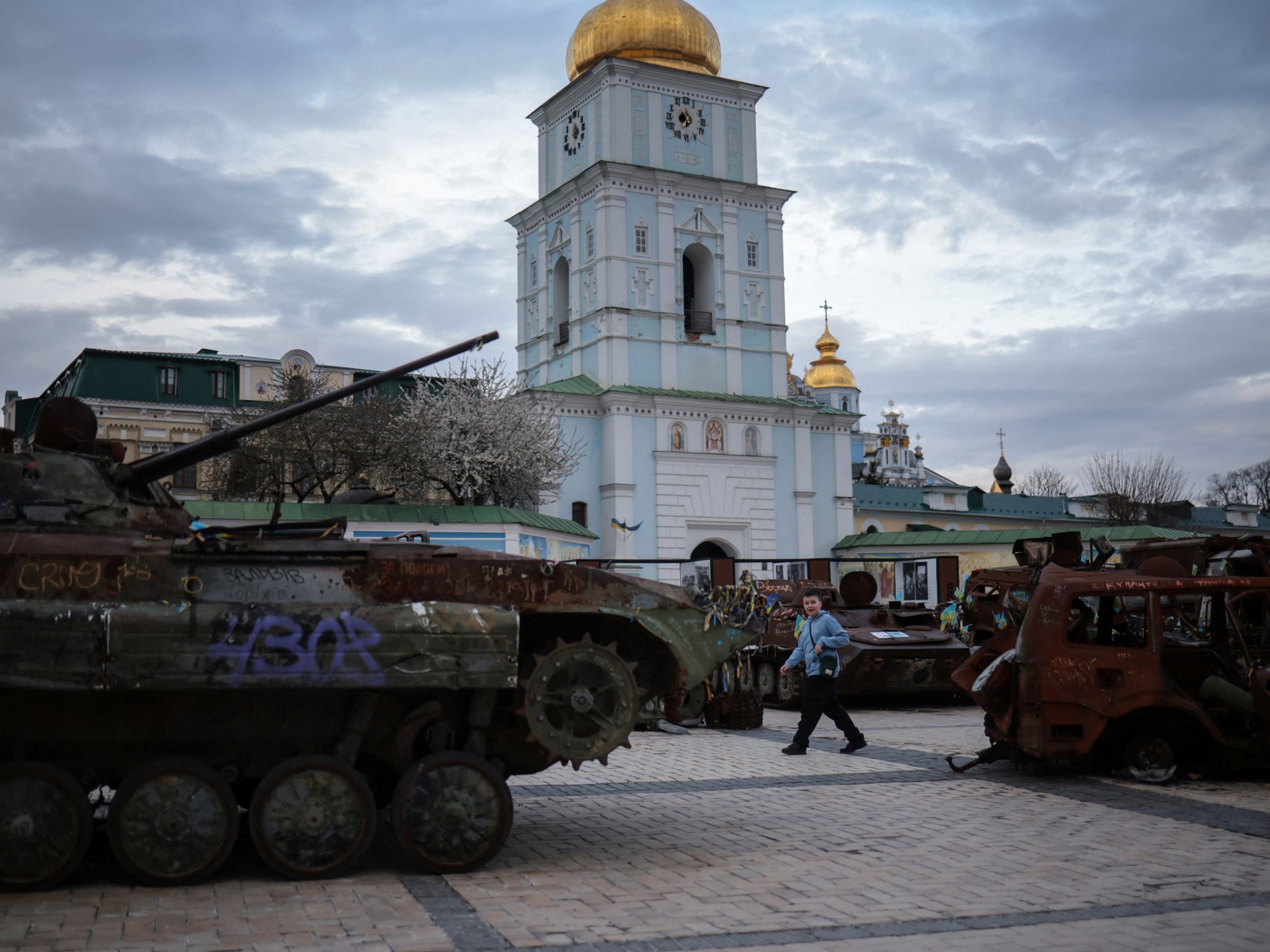
President Donald Trump says the United States will “take a pass” on trying to resolve the Russia-Ukraine war if either Moscow or Kyiv makes it too difficult to end the conflict.
Trump was speaking after US Secretary of State Marco Rubio commented – following talks with European allies in Paris – that Washington would “move on” if a truce did not seem “doable” within days.
The US president refused on Friday to cast blame on either Russian President Vladimir Putin, who ordered the February 2022 full-scale invasion of pro-Western Ukraine, or Ukrainian President Volodymyr Zelenskyy. But he insisted both sides had to make progress.
“Now, if, for some reason, one of the two parties makes it very difficult, we’re just going to say: ‘You’re foolish. You’re fools. You’re horrible people’ – and we’re going to just take a pass,” Trump said.
“But, hopefully, we won’t have to do that.”
Rubio further suggested on Friday that Trump’s patience towards the negotiations is running thin.
“If it’s not possible, if we’re so far apart that this is not going to happen, then I think the president is probably at a point where he’s going to say, ‘Well, we’re done,’” he said.
Trump told reporters on Friday, however, that he did not want to say he was walking away from the talks. He said he still believes there is a good chance to end the conflict.
“It’s coming to a head right now,” he said.
US Vice President JD Vance also said he was “optimistic” a resolution could be reached, while speaking on a trip to Rome.
‘Trying to help’
Ukraine has agreed to a full temporary ceasefire and accused Russia of stalling on a deal to get a better negotiating position.
Putin last month rejected a joint US-Ukrainian proposal for a full and unconditional pause in the conflict, while the Kremlin has made a truce in the Black Sea conditional on the West lifting certain sanctions.
When asked if Putin was stalling, Trump, who held direct talks with the Russian leader in February, said: “I hope not … I’ll let you know soon.”
Trump also denied he was being “played” by the former KGB agent, who denied Russia was going to invade right up until the eve of the attack.
“Nobody’s playing me, I’m trying to help,” Trump said.
Russia’s Foreign Minister Sergey Lavrov said in an interview with the Kommersant newspaper published on Monday that it is “not easy” to agree on “key components” of a peace deal.
He did, however, concede that the Trump administration is trying to understand the “root cause” of the conflict, which he said was triggered by “the actions of Washington and Brussels” in having “brought the current regime to power in Ukraine”.
Fighting continues
Amid ceasefire negotiations, on the front line on Friday, a Russian missile strike killed one person in the northeastern Ukrainian city of Kharkiv, with a separate drone attack killing another person in the nearby city of Sumy.
At least five children were among dozens of people injured in Friday morning’s attack on Kharkiv that damaged 15 residential buildings, a business and an educational facility, according to Kharkiv Mayor Ihor Terekhov and emergency services.
Reporting from Kyiv, Al Jazeera’s Zein Basravi said Russia also targeted Lviv, Dnipro, Mykolaiv and Kyiv.
“We saw multiple missile, drone, artillery and rocket attacks in cities across the country about 5am local time when curfews come to a close and people begin their daily lives,” he said.
“[In Kharkiv], civilian infrastructure was damaged, one person was killed, and 74 were injured. Of the 74, five were children,” Basravi reported.
President Zelenskyy said on Thursday that although Russia had seemingly scaled back its targeting of energy infrastructure, the overall volume of missile and drone attacks remained unchanged. It is striking Ukraine’s civilian sites instead, he added.
Russia has said it had hit “key drone production sites” and Ukrainian military airfields.
Moscow also warned on Friday of potential escalation if Germany proceeds with plans to send Taurus long-range missiles to Ukraine. Speaking at the United Nations on Thursday, Russia’s ambassador, Vassily Nebenzia, declared that such a move would mark Germany’s direct entry into the war.
“These countries are waging a war against Russia using their proxy forces,” he said. “Delivering Taurus missiles would be another step toward escalation.”
Conflict Zones
‘How do I live like this?’ asks Gaza boy who lost arms in Israeli attack | Gaza News
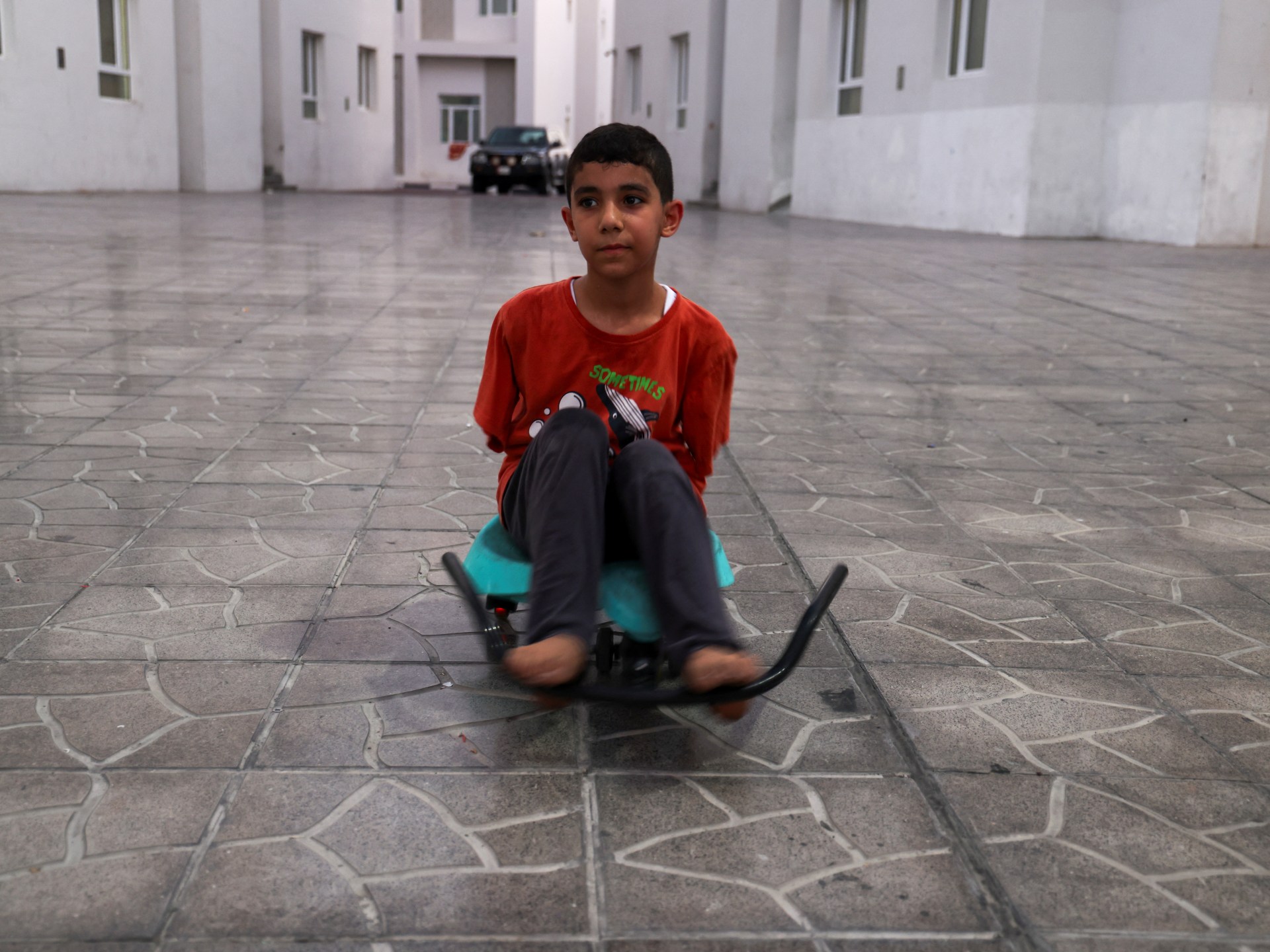
An image of Mahmoud Ajjour, 9, who was severely wounded in an Israeli strike, won the 2025 World Press Photo of the Year award.
A Palestinian child who was severely wounded in an Israeli drone attack on Gaza last year, and who was pictured in an image that won the 2025 World Press Photo of the Year award, says he has been struggling to adapt to life since losing both his arms in the explosion.
Speaking to Al Jazeera from Doha, Qatar, where he has been receiving treatment, nine-year-old Mahmoud Ajjour recalled the moment the bomb exploded, targeting his home in March 2024.
At first, Ajjour, who hails from Gaza City’s old town, said he did not realise he was wounded.
“I thought I had simply fallen. But I found myself on the ground, exhausted, and wondering what had happened,” he told Al Jazeera.
In reality, one arm “flew off, and one flew and fell right beside me”, he added.
Still unaware that he had sustained serious wounds – wounds that mutilated his entire body – Ajjour said he looked around and saw his arms. Although they looked familiar, his brain still could not comprehend that they had been blown off.
“My mother then told me that I lost my arms,” Ajjour recalled. “I started crying. I was very sad, and my mental state was very bad.”
His mental health deteriorated further when he, like many others in Gaza, had to undergo surgery without anaesthetics due to a severe lack of medical supplies. Throughout the war, Israeli forces have largely kept vital border crossings shut, preventing the entry of much-needed medical supplies, as well as food and other aid, including fuel.
“They performed surgery on me while I was awake,” Ajjour said, the shock still evident in his voice.
“I couldn’t bear the pain, I was screaming very loud. My voice filled the hallways.”
‘Everything is difficult’
Ajjour is one of thousands of children in Gaza who are suffering life-changing injuries due to relentless, indiscriminate Israeli bombardment.
According to the United Nations Children’s Fund, more than 10 children each day have lost one or both of their legs since October 7, 2023, when Israel launched its ongoing genocide in Gaza.
That is more than 1,000 children.
“Gaza now has the highest number of children amputees per capita anywhere in the world – many losing limbs and undergoing surgeries without even anaesthesia,” UN Secretary-General Antonio Guterres said in December.
Ajjour is now learning to write, play games on his phone, and dress himself using his feet – but still needs special assistance for most daily activities.

He now longs for the days when his arms were still intact.
Before the attack, Ajjour said he used to go to the market and buy his mother vegetables and food she needed.
“Now, everything is difficult, including feeding myself, helping myself to the bathroom … but I try my best,” he said. “I manage my life like this. I make it work.”
Ajjour dreams of a future where he can return to Gaza and help rebuild the devastated enclave.
He hopes the world can “end the war on Gaza”.
“We want to live on our land. We don’t want the Israelis to take it,” he said.
“People are dying there [in Gaza]. And my home was bombed. How could I live like this?”
Israel’s ongoing assault on the besieged and bombarded territory has so far killed more than 51,000 Palestinians and wounded at least 116,505 others, according to Gaza’s Ministry of Health.
It has also forcibly displaced most of its 2.3 million strong population, ravaged most of the land, damaged basic infrastructure and dismantled its already-struggling healthcare system.
Conflict Zones
Iran has ‘doubts’ about US intentions ahead of nuclear talks | Politics News
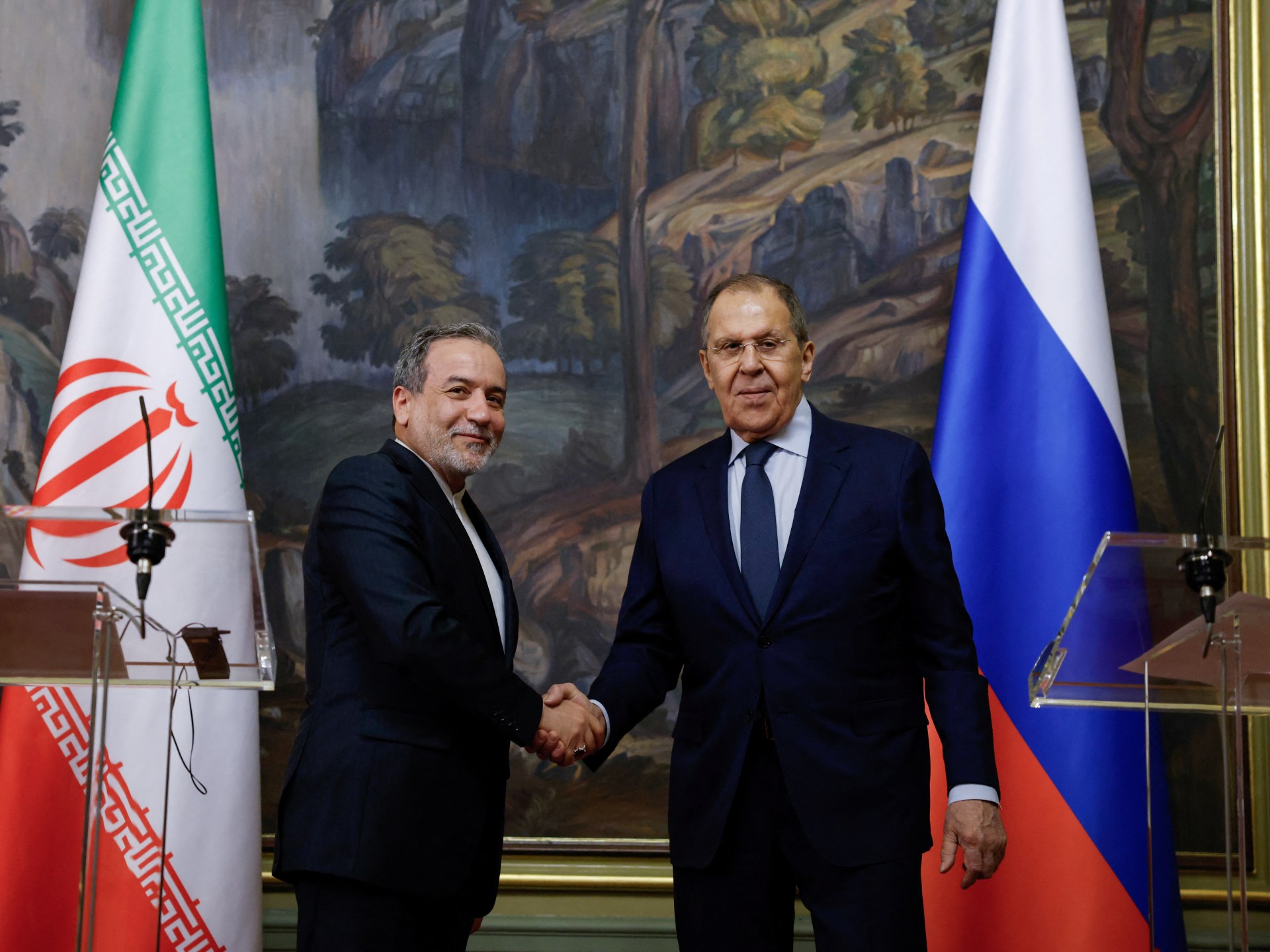
Iran’s Foreign Minister Abbas Araghchi has cast doubt over the intentions of the United States a day before a second round of nuclear talks is set to take place with Washington.
The new round will come a week after the two countries held their highest-level negotiations since US President Donald Trump unilaterally abandoned a 2015 landmark nuclear deal three years later. Iran has since abandoned all limits on its nuclear programme, and enriches uranium to up to 60 percent purity – near weapons-grade levels of 90 percent.
“Although we have serious doubts about the intentions and motivations of the American side, in any case, we will participate in tomorrow’s negotiations,” Araghchi said on Friday during a news conference in Moscow with his Russian counterpart, Sergey Lavrov.
Araghchi will set off on Saturday for Rome for a new round of Omani-mediated talks with US Middle East envoy Steve Witkoff.
“We are fully prepared to pursue a peaceful resolution for Iran’s peaceful nuclear programme,” Araghchi said.
Lavrov said Moscow was ready “to play any role that will be useful from Iran’s point of view and that will be acceptable to the United States”.

Russia, which commands the world’s largest confirmed arsenal of nuclear weapons, has deepened its military ties with Iran since it launched its offensive on Ukraine in February 2022, and has played a role in Iran’s nuclear negotiations in the past as a veto-wielding United Nations Security Council member.
Western countries, including the US, have long accused Iran of seeking to acquire nuclear weapons – an allegation Tehran has consistently denied, insisting that its programme is for peaceful civilian purposes.
Al Jazeera’s Tohid Asadi, reporting from Tehran, said there is “a cloud of mistrust in the air” despite statements made by Araghchi.
“With the talks ahead, there is a perception among Iranians that there is this mistrust that exists pertaining to the United States, but going back to the statement that were heard today … we saw a mix of doubt and hope at the same time,” Asadi said.
“Iran is saying it is not interested in putting other issues … [such as] nuclear capabilities … on the table of negotiations,” he added.
‘Unrealistic demands’
US President Donald Trump has threatened to attack Iran if it does not agree to a deal with the US.
On Tuesday, Iran’s Islamic Revolutionary Guard Corps said the country’s military capabilities were off limits in the discussions.
The official IRNA news agency reported Iran’s regional influence and its missile capabilities, long criticised by Western governments, were among its “red lines” in the talks.
On Wednesday, the Iranian foreign minister said Iran’s enrichment of uranium was not up for discussion, after Witkoff called for it to end.
“If there is similar willingness on the other side, and they refrain from making unreasonable and unrealistic demands, I believe reaching an agreement is likely,” Araghchi said during Friday’s news conference.
Lavrov emphasised that any potential agreement should only pertain to the nuclear issue.
“This is a fundamental point that must be taken into account by those who try to burden the negotiations with non-nuclear issues and thus create a very risky situation,” he said.
Iran told the US during last week’s talks it was ready to accept some limits on its uranium enrichment, but needed watertight guarantees Trump would not again ditch the pact, an Iranian official told the Reuters news agency on Friday, speaking on condition of anonymity.
The official said Tehran’s red lines “mandated by Supreme Leader Ayatollah Ali Khamenei” could not be compromised in the talks, adding that those red lines meant Iran would never agree to dismantle its centrifuges for enriching uranium, halt enrichment altogether, or reduce the amount of enriched uranium it stores to a level below the level it agreed in the 2015 deal.
It would also not negotiate over its missile programme, which Tehran views as outside the scope of any nuclear deal, Reuters reported.
US Secretary of State Marco Rubio said earlier on Friday that the US administration is looking for a peaceful solution with Iran but will never tolerate the country developing a nuclear weapon.
Rubio met with British, French and German officials in Paris and pressed them to maintain sanctions against Iran instead of allowing them to run out.
Israel also reiterated its unwavering commitment to preventing Iran from obtaining nuclear weapons, saying it had a “clear course of action” to prevent this.
“Prime Minister Benjamin Netanyahu and I, along with all relevant bodies, are committed to leading a clear course of action that will prevent Iran from acquiring nuclear weapons,” Defence Minister Israel Katz said on Friday.
-

 Conflict Zones2 days ago
Conflict Zones2 days agoHaiti in ‘free fall’ as violence escalates, rights group warns | Armed Groups News
-

 Lifestyle2 days ago
Lifestyle2 days agoBelievers say microdosing psychedelics helps them. Scientists are trying to measure the claims
-

 Lifestyle2 days ago
Lifestyle2 days agoPicking a team from bars to beam and hoping for 10s: Fantasy leagues in gymnastics are a thing
-

 Sports2 days ago
Sports2 days agoJu Wenjun: Chinese grandmaster makes history by winning fifth Women’s World Chess Championship
-
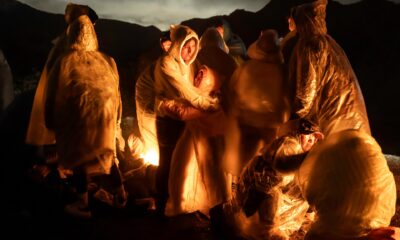
 Middle East2 days ago
Middle East2 days agoPalestinian photographer Samar Abu Elouf wins world’s top photo prize | Gaza News
-

 Sports2 days ago
Sports2 days agoArsenal reaches first Champions League semifinal in 16 years, with Inter Milan also advancing
-
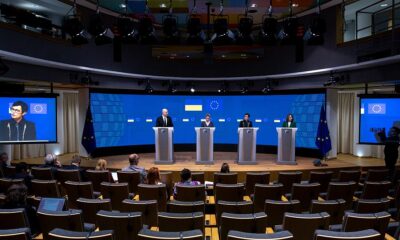
 Africa2 days ago
Africa2 days agoEuropean Union announces new asylum measures
-

 Europe2 days ago
Europe2 days agoTrump blasts Fed Chair Powell, saying his ‘termination cannot come fast enough’




